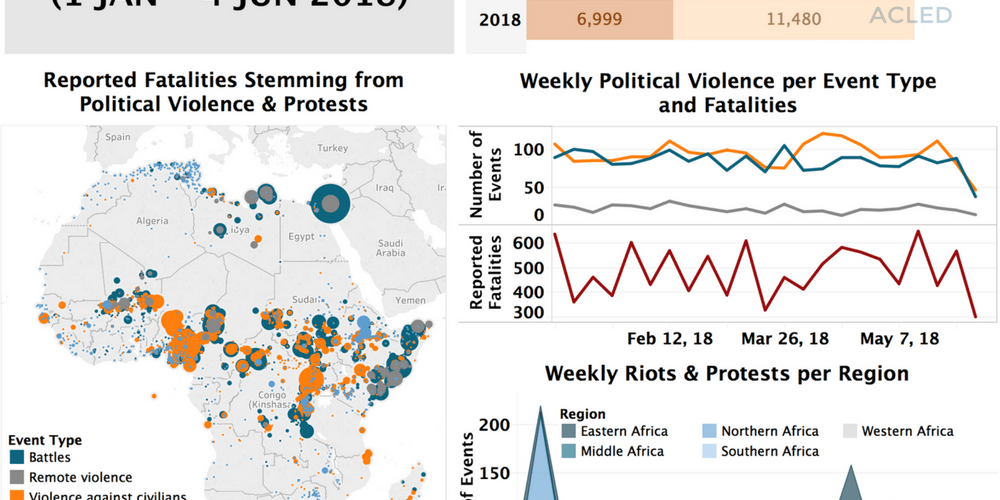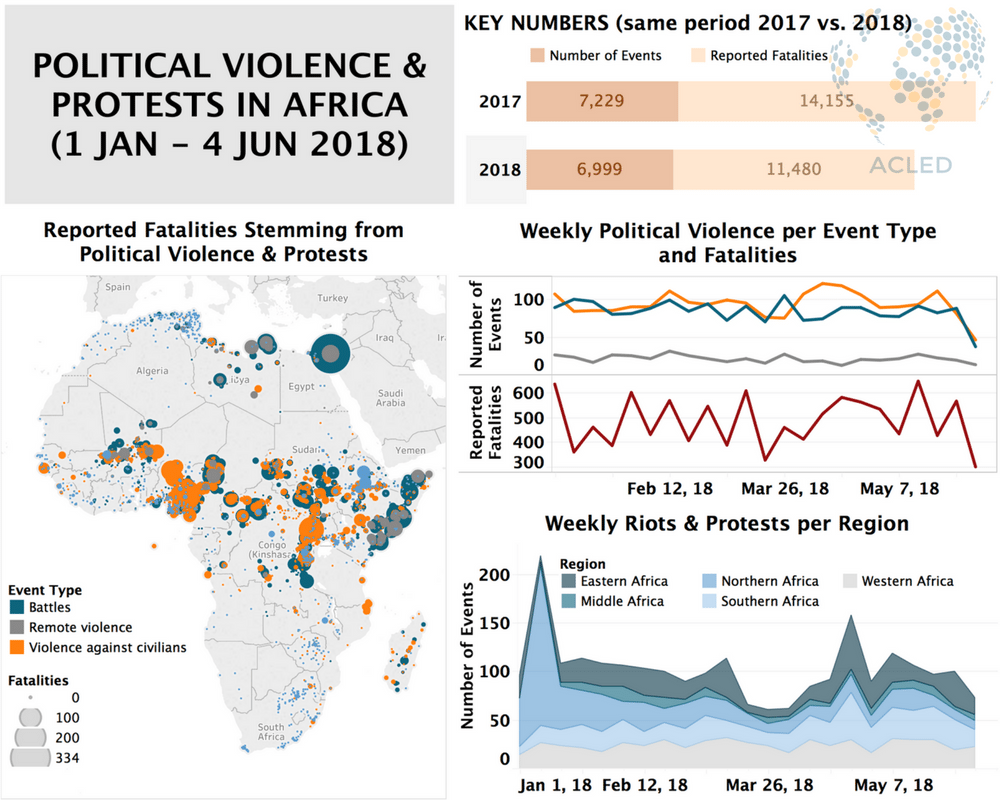Key developments in Africa on the week of June 3rd include the fragile situation in Ethiopia, where political and economic reforms are endangered by ethnic violence; the heavy campaign led by Al Shabaab during the Ramadan month in Somalia; the continued violence in CAR’s Bambari area and in Mozambique’s Cabo Delgado region; and other relevant events across the continent.
In Ethiopia, two months after having been sworn in, Prime Minister Ahmed continues to unveil key political, security and economic reforms to reposition the country onto a positive development trajectory. The lifting of the state of emergency two months earlier than planned on June 5th –and the subsequent replacement of the heads of the air and armed forces –were seen as key steps in this direction. So was the dramatic shift in the government’s stance towards implementing the 2000 Algiers peace agreement with Eritrea and the Ethiopian Eritrean Boundary Commission decision, on the grounds that neither country was benefitting from the stalemate. Yet, the persisting ethnic tensions throughout the country endanger these gains at the policy level. Violence continues to be reported between the Liyu police and the Oromo communities in the Oromia and Somali regions for instance, while clashes have also been reported between other groups: the Guji and Gedeo communities in the Southern Nations, Nationalities and Peoples’ Region (SNNPR); the Oromo and Gedeo communities along their common border; the Oromo and Amhara groups in Oromia; and the Tigray and Afar groups in the Afar region.
In Somalia, Al Shabaab stepped up its military campaign during the Ramadan month. The militants attacked several AMISOM bases (Qoryooley, Shalaambood, Amabareson and Baraawe) in Shabeellaha Hoose region on June 2nd and 5th, and overran a police post around Dharkenley, Banaadir region on June 4th and a military base in Daynuunay, Bay on June 7th. Al Shabaab also briefly captured the town of Ceel Waak in Gedo region on June 5th, forcing local forces to flee for safety in Kenya. And on June 8th, the group launched a mortar attack on a joint US-AMISOM patrol in Jamaame in Jubbada Hoose region, leaving one American soldier killed and thus causing heavy notice in the western press. Counterinsurgency operations caused several casualties on Al Shabaab’s side as well. The group suffered particularly high fatalities in the Bari region as the military forces of Puntland and US launched operations against the group in the Maraja valley in Bossaso from June 2nd.
In the Central African Republic (CAR), elements of the Union for Peace (UPC) and Anti-Balaka have been increasingly violent in the Bambari area of Ouaka prefecture in 2018, prompting large-scale counter-operations by the MINUSCA. On May 31st, MINUSCA struck the UPC positions in Bambari, reportedly killing 70 and forcing the militants further south, towards Kouango. The following week in Bambari was marked by a “dead city” day proclaimed by economic actors in support of the UPC and by clashes between the UPC and Anti-Balaka forces as the UPC attempted to regain grounds in Bambari.
In Mozambique, violence by Islamist insurgent cells commonly referred to as Ahlu Sunna Wal Jamaa continues to spread in Cabo Delgado region. Among the nearly 70 fatalities reported since the group started its operations in October 2017, 30 occurred over the first week of June only. Battles were reported in Palma district following the militants’ beheading of 10 civilians in the district on May 31st. Heavy fatalities were also reported from further civilian targeting by the militants last week in Mucojo and Namaluco in Macomia district. In parallel, the group was reported to be conducting recruitment drives in Nampula, luring young people into their ranks under the promise of jobs. Mozambique is strengthening its partnerships with powers in the region to fight Islamic fundamentalism, most recently gaining the support of the Democratic Republic of Congo
Relevant political developments and protests marked many other areas of the continent. In Burundi for instance, president Nkurunziza announced that he would not run for another presidential term, assuaging fears that he would take advantage of the recent changes to the constitution. The move came a few days after he called for nationwide protests against the “false and inflammatory” statements made by the French government and the UN Special Representative of the Secretary-General on the situation in Burundi. It seems unlikely that this move was prompted by self-reflection or opposition strength, suggesting that intra-CNDD-FDD politics may be a paramount concern.
In Sierra Leone, political targeting continues nearly two months after the presidential vote. At least two members of the opposition All People’s Congress (APC) were beaten and murdered in Freetown end May by “thugs” reportedly associated to the ruling Sierra Leone People’s Party (SLPP). In Zimbabwe, disorder around primary elections continues, shifting now to the opposition Movement for Democratic Change (Tsvangirai Faction) primaries. In Togo, opposition parties resumed their demonstrations in Lome to call for a return to the old Constitution of 1992, which would limit the president’s maximum term limit to five years, after a month of calm during the negotiations. Police and government repression were instrumental in hindering the demonstrations. In Algeria and Tunisia, protests spread to denounce the unjust treatment of Berber civilians and the socio-economic conditions driving people to migrate across the Mediterranean, respectively. Finally, violent service-delivery protests, particularly over housing, continue to be a dominant feature of the political violence landscape in South Africa. These protests are often located in informal urban settlements (demanding more formalised housing) as well as more developed settlements which board these informal settlements (critical of the increase in informal neighboring settlements).They have particularly affected areas in Western Cape.







